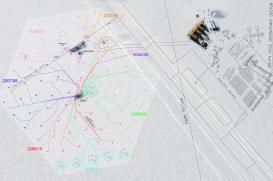Directly correlated to the Anthropocene is the concept of the “technosphere.” Although the term has a longer history extending at least back to the 1970s, recent debates about the Anthropocene have given it new traction and urgency. Reintroduced by the geoscientist Peter K. Haff and his colleagues, the technosphere describes the system that has emerged throughout the modern era to harvest, metabolize, and also squander energy and materials. A globe-spanning mesh of technological, ecological, and social complexes of circulation, this system has achieved functional parity with natural geospheres such as the biosphere or hydrosphere. The technosphere thesis raises the question of technological agency in the Anthropocene and how technologies act to shape our world in ways that are not direct elaborations of human intention. A publication venture that resulted from the first Anthropocene Campus encompassed two special issues of the journal The Anthropocene Review, collecting a wide range of contributions from history of science, Earth system science, geology, chemistry, social sciences, and arts. Together, these papers highlight both the need to think of technological agency as a systemic phenomenon and the limitations of this paradigm.

The IceCube Neutrino Observatory at the South Pole.
Source: IceCube Collaboration/NSF
Project
(2017-)
